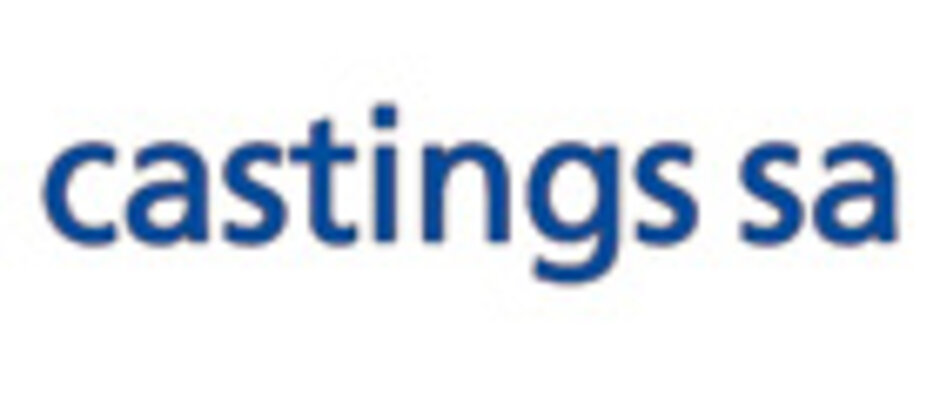A new era for the SAIF
This exciting period begins with the appointment of the first ever CEO, and a move to new offices.
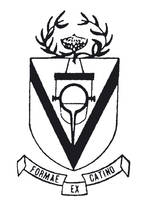 With John Davies coming into office as the very first full time CEO for the South African Institute of Foundrymen (SAIF), it begins a new and exciting chapter in the relatively short history of the SAIF.The SAIF was formed in 1964 having previously been the South African branch of the Institute of British Foundrymen (now the Institute of Cast Metals Engineers). A branch, the Western Cape Institute of Foundrymen (WCIF), was formed in 1982.
With John Davies coming into office as the very first full time CEO for the South African Institute of Foundrymen (SAIF), it begins a new and exciting chapter in the relatively short history of the SAIF.The SAIF was formed in 1964 having previously been the South African branch of the Institute of British Foundrymen (now the Institute of Cast Metals Engineers). A branch, the Western Cape Institute of Foundrymen (WCIF), was formed in 1982.
It also brings to a culmination a period where committed personnel in the industry have been working tirelessly on a voluntarily basis to get the funding to bring the SAIF to this position, and take the institute into a full time professional body in the future that will serve the industry at large.
Davies has begun with great hopes and expectations but he faces daunting challenges with the economy still in the doldrums. But reports show that manufacturing and the economy in general has reached the bottom and is slowly starting to rise again. The SAIF council members believe that Davies is up to the challenges. If anything, the expectations may be too high, given the level of complexity involved in implementing the initial mandate that the SAIF has been given, namely training foundrymen/women for the future.
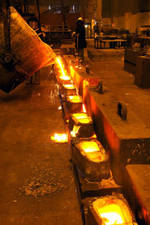 What value can we perceive in the South African Institute of Foundrymen?
What value can we perceive in the South African Institute of Foundrymen?
This was the question asked at a meeting of industry personnel a few years back. In fact it was more direct than that. What would my business get in return if I had to pay R 5000.00 a year subscription?
It got me thinking as the SAIF is close to my heart, as is the industry. You can perceive value if there is money involved, but when actions are carried out that do not necessarily involve money, it is not always easy to see what is happening in the background unless these actions are pointed out. So I have decided to tell you exactly what the SAIF has been doing for the industry and its members recently. I can tell you the Institute is not an ‘old boys club’ run by a bunch of ‘old farts’ only interested in getting together for some drinks.
The primary objective of the SAIF is the advancement of the sciences related to the manufacture and utilisation of metal castings through education and, the dissemination of technology and research.
The SAIF has always been run on a voluntary basis and is run by an elected executive and council members with a secretary employed in a half-day capacity three days a week until recently. The members consist of individuals, foundries, as well as suppliers to the industry.
The SAIF was instrumental in organising two National Pavilions at GIFA/NEWCAST in Germany in 2003 and 2007 – sponsored by TISA/DTI. Over 30 companies have benefited from this international exposure. Currently the SAIF is working on securing the same for the next GIFA/NEWCAST which takes place at the end of June 2011.
The foundry industry was identified as one of the manufacturing sectors in South Africa with a significant potential for growth. In view of this, in 2003 the SAIF commissioned a Foundry Industry Analysis Survey, on behalf of the DTI.
As a result of the findings a Foundry Technology Road Map was commissioned in 2004 by the SAIF, again in conjunction with the DTI.
Independently, and supported by the SAIF, the University of Witwatersrand, School of Economic and Business Sciences carried out a survey on the Technology, Skills Development, and Institutional Constraints in the South African Foundry Industry, as part of their Corporate Strategy and Industrial Development (CSID) research project.
A direct result of this survey saw the establishment of a Training Work Group, meeting on a two weekly basis, and concentrating on setting the National Standards for Melting, Patternmaking and Moulding. This steering group consisted of foundrymen and training officers from local foundries and has been facilitated by Simon Roberts and his colleagues from Wits University.
The results of this can be seen in the separate report in this issue entitled “National Foundry Career Path Project”.
Throughout this period the SAIF has continued to run regular training courses and every month has had a technical meeting, principally with international speakers giving the lecture. Likewise its branch, the WCIF, has been very active in running its Operator Program and Diploma in Foundry Technology training courses, approved by MERSETA in 2003.
The SAIF has been in negotiations with government and the other role players to devise an equitable solution as to the price of scrap metal as well as attending the meetings on hazardous scrap.
On the social side the annual SAIF Awards Evening and Golf Day are always organised and well attended.
Vision of the SAIF council at the time
At the time of the industry meeting it was stated that the vision of the council was to ensure that the SAIF becomes a key pivotal role-player in the manufacturing industry. The SAIF aims were to structure it to be inclusive of all industry role-players and stakeholders in terms of:
- Skills development
- Transfer of technical knowledge
- A central liaison for industry related matters
- The SAIF was committed to the NCTC initiative which later changed to the NFTN
The SAIF will have to be transformed into a full time professional body with a full time Director/CEO whose duties would be to implement a regular training course programme, based on the MERSETA recognised WCIF course, increase the membership base, set standards for the industry to adhere to, elevate the status of the Institute so that it is a must for companies to be a member, liaise with all Government Departments related to our industry, be involved with and part of the process of all future policy decisions affecting the industry, liaise with other like minded Institutes/Associations, increase the awareness of the South African foundry industry both locally and internationally
This vision started to bear fruit when it was announced by the DTI late in 2007 that R38 million had been made available for the foundry industry for the establishment of the NFTN with the SAIF and ACA and its members as the key stakeholders. Unfortunately, in the eyes of those who had worked so tirelessly to secure this funding it was seen as a ‘hijacking’ when the CSIR was contracted by the DTI to undertake the establishment of the NFTN and with CSIR staff, CSIR consultants and ex CSIR staff controlling the NFTN and spending the allocated monies.
Fortunately this has now changed with the resignation of the first NFTN project leader late last year and someone from outside the industry being appointed. See a separate story in this issue.
Nevertheless the SAIF pursued with its vision and late last year secured funding from the NFTN, and was mandated by the NFTN to be the provider of a substantial training and career path awareness project directed at foundries (of all persuasions) and schools, respectively. With this came the appointment of a CEO in February 2010, namely John Davies.
Davies has moved fast and will shortly be rolling out the plan for training of existing and future foundry personnel.
New offices
However Davies first had to find a venue that would be suitable for his planned implementation of the training programme. With the SAIF’s close liaison with the UJ and MCTS he decided to rent offices from The University of Johannesburg (UJ) in the same facility that houses the Metal Casting Technology Station (MCTS).
The SAIF will remain as an independent body but now, because of its new location, it will have access to professional presentation facilities including a conference room and the foundry and research laboratories that are located at the UJ/MCTS.
Davies pointed out that the SAIF will continue its commitment to and increase its involvement with other higher education institutions such as FET Colleges, Adult Education and Training (ABET) and the skills development sector at large.
He was also proud to announce that the SAIF branch in the Western Cape, the WCIF, was at an advanced stage of setting up a foundry school which will be based in Atlantis.
| University of Johannesburg Metal Casting Technology Station - Metallurgy Room G101, John Orr Building Corner Siemert and Beit Street Doornfontein, Johannesburg, Gauteng. | John Davies Tel: 011 559 6468 Cell 083 630 2809 Email: <link>jdavies@uj.ac.za | Bets Kleynhans Tel: 011 559 6455 Cell 083 598 7840 Fax: 011 559 6526 Email: <link>betsk@uj.co.za |
The postal address remains the same.
The future
With a full time champion (John Davies – CEO) in place now, the SAIF and its branch the WCIF and the respective members can look forward to a positive future.
The announcement about the Department of Science and Technology’s (DST’s) Technology Localisation Programme (TLP), through which 28 local foundries would be provided with technology assistance packages to enhance their capabilities in terms of accessing contracts and creating jobs, is further proof that the SAIF are working behind the scenes.
The SAIF is also working feverishly to assist its members to leverage the CSDP spend of Eskom and Transnet and there are a number of other initiatives that will be announced in the future.
National Foundry Career Path Project
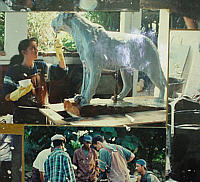 Interaction between the SAIF, NFTN, AFSA, GTZ Tshumisano Trust and MCTS has led to the imminent finalisation of the project.
Interaction between the SAIF, NFTN, AFSA, GTZ Tshumisano Trust and MCTS has led to the imminent finalisation of the project.
The Foundry industry is a complex and specialised sector supplying a vast range of quality metal products to downstream customers. The emergence of South Africa as a cost effective supplier to international markets has created a demand for people with the skills to manufacture the final products as well as function within the support processes to the manufacturing process. These processes include foundry patternmaking, foundry moulding and foundry melting.
The Foundry Career Path Framework Project was initiated in September 2008 with the first industry workshop being held in October 2008. The overall objectives of this project were to:
•Re-design the draft Foundry qualifications (NQF Level 2 – 4) in accordance with the newly developed qualification design model
•Develop an occupational profile to articulate with existing qualifications in specific foundry sectors
•Create a learning pathway / career path framework
•Develop curriculum in support of the occupational profile
•Negotiate the process of registering the qualifications and unit standards on the NQF with SAQA
•Keep the project informed of the criteria and guidelines being developed regarding the occupational qualifications of the QCTO
A project team and various smaller working groups were established that met on different occasions for different purposes. The project process were driven by two primary industry objectives namely to produce sound castings and to remain competitive. Working within the parameters of these two primary objectives, a project approach and process was designed in order to meet the project objectives above.
The Foundry Industry rallied their support, and their commitment to this project is clearly evident in the substantial achievements of this project in the past 14 months. Both the project processes and achievements are reflected in documents posted at:
<link http: www.labrats.ws foundryproject index.html _blank external-link-new-window>
www.labrats.ws/foundryproject/index.html
and industry representatives are requested to comment on the last set of deliverables achieved during 2009.
Gratitude is expressed to the entire Foundry Industry including member companies, institutions, associations, partners, subject matter experts and individuals who have selflessly given of themselves, their time, energy, knowledge and experience to make all these achievements possible.
Secondly, the funding partners for their unwavering support and (on occasion) guidance, through amongst others the benchmarking activities, ensuring that we remain grounded in local and international best practice.
Industry feedback meetings
A full industry workshop was held on 20 January 2010 at the Birchwood Conference Centre during which the industry was required to raise any comments, suggest changes and amendments etc., in order to sign off acceptance of these curricula for implementation of the pilot project being planned.
The pilot project is planned to start on 1 July 2010 at three sites namely Scaw Metals, ArcelorMittal and Atlantis Foundries. The idea is to start with two qualifications namely melter and moulder with the understanding that these learners will be available to the industry and not be taken up by these three companies. This will be facilitated by SAIF.
The two industry feedback meetings will take place and you are urged to participate. The dates are set for 12 May, 2010 and 13 October 2010 and will take place at The Birchwood Hotel & Conference Centre, Boksburg, Gauteng from 9:00 – 12:00. Please RSVP to Lucky Juganan at <link>luckyj@uj.ac.za to confirm your attendance and for directions to the venue. Alternatively if it is more convenient you can call or sms him on his mobile phone 072 832 8744.
SAIF looking for training providers / skills development practitioners
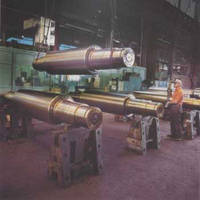 In the foundry industry (as in business in general), there are several ways of getting something done.
In the foundry industry (as in business in general), there are several ways of getting something done.
The first is that you have enough experience to do it yourself and at the same time you become a mentor/teacher for your employees. If you don’t have the experience or for that matter the time, you can identify a consultant who can advise you on how best to do it, charge you a heap of money and who will walk away if problems occur.
However in the case of training or further educating your employees there are strict guidelines in place if you so wish to obtain the repayment of a percentage of the levy grant (as per the Skills Development Levies Act) from the Sector Education and Training Authorities (SETAs).
South Africa’s so-called skills revolution – which critics feel has never really taken hold since it was launched 10 years ago – was given a much needed impetus last year when the skills development section of the Department of Labour was transferred to the newly created Department of Higher Education and Training. This has resulted in the launch of the Quality Council for Trades and Occupations (QCTO) . The third phase of the National Skills Development Strategy (NSDS3) – which will run from 2010 to 2015 – has also been written up, despite many political wranglings between the various bodies and departments.
The QCTO has been established to support and improve quality assurance for learning in and for the workplace. Higher education institutions such as FET Colleges, Adult Education and Training (ABET) and the skills development sector were now included in a single Department of Higher Education and Training.
The QCTO therefore has equal relevance to employers and skills development practitioners because the NSDS3 has a stronger annual training reporting requirement than its predecessors in order for the impact of the strategy to be assessed.
Short course provisioning is one of the most dynamic features of the emerging education and training system of South Africa. This kind of provisioning is particularly associated with ‘just in time’, and ‘just enough’ learning to meet a specific need in workplace environments. Therefore, it is considered a viable and common method for optimal workplace functioning in all contexts and greatly facilitates access to learning in a manageable manner in terms of cost, time, energy and resources, for both the employer and employee.
In addition, short course provisioning has a wider focus than workplace contexts: where
research findings are disseminated and new knowledge is shared, it is also associated with continuing professional development.
A third area where short course provisioning is important is where learners require a targeted short learning programme, to upgrade skills and knowledge to ensure success in their chosen field of learning.
It should be noted that short courses which are credit-bearing and/or based on unit
standards are most in demand and readers are encouraged to view the short course
offerings with the registered unit standards authority SAQA.(see <link http: www.saqa.org.za _blank external-link-new-window>
SAIF mandated to provide short course training and career path awareness
The SAIF was last year mandated by the NFTN to be the provider of a substantial training and career path awareness project directed at foundries (of all persuasions) and schools, respectively. The essence of the project is to act as a clearing house for managing and subsidising industry oriented training for both qualification based courses and specialist subject courses and seminars of direct relevance to foundries. The career awareness aspect of the project is a first for the SAIF as it looks beyond the current recession and is aimed mainly at schools in an effort to promote the foundry industry as a career path.
This project aligns the SAIF career path activities aiming at national qualifications and curriculum development, with strong collaboration between Industry, SAIF, NFTN, AFSA, GTZ, ACA, the University of Johannesburg and the Tshumisano Trust. See separate story in this issue.
Training providers / skills development practitioners wanted
The SAIF will shortly be rolling out to industry MERSETA recognised short course Operator Programme training courses which will lead to the selection for participation in a Diploma in Foundry Technology qualification and, the more advanced foundry qualifications (NQF Level 2 – 4) which are currently being ratified by the authorities.
Although the SAIF has a short list of training providers / skills development practitioners, the Institute is looking for more to help in its endeavour to play a major role in the up-skilling and multi-skilling of human resources in the industry from grassroots level up.
The survival of the foundry industry in South Africa will depend increasingly on the development of meaningful career and learning pathways for existing employees as well as those that will join the industry in future. Therefore the participation by experienced foundrymen and women in this project by offering to share their knowledge, whether it be in lecturing, training or mentoring, is vitally important.
For further details contact John Davies, the new CEO of the SAIF, on TEL: 011 559 6468 or on his Cell: 083 630 2809
NFTN welcomes new project leader - Letlotlo Phohole
 The NTFN and its Steercom as funded by the dti, are delighted to appoint Letlotlo Phohole as the new Project Leader. Letlotlo will strive to continue delivering on the NFTN's objective of facilitating the development of a globally competitive South African foundry industry.
The NTFN and its Steercom as funded by the dti, are delighted to appoint Letlotlo Phohole as the new Project Leader. Letlotlo will strive to continue delivering on the NFTN's objective of facilitating the development of a globally competitive South African foundry industry.
Letlotlo has a process control & automation engineering, as well as technology management background with many years of research, development and technology transfer experience in various industries, predominantly in the mining and manufacturing sectors.
He brings a technically competent approach to the foundry network coupled with a strong emphasis on programme management. His previous position was to manage R&D programmes and technology transfer vehicles at the Advanced Manufacturing Technology Strategy (AMTS) Implementation Unit of the DST.
Letlotlo tertiary education includes a National Diploma: Electrical Engineering (Light Current) Process Control & Instrumentation from Peninsula Technikon, a Bachelor of Technology: Electrical Engineering (L/C) from Peninsula Technikon, a Bachelor of Science (Honours) Technology Management from University of Pretoria and a Msc (Technology Management) – research topic: “Patent Intelligence as a proxy for science and technology linkage indication” from University of Pretoria.
He will be a major asset to the industry as we continue our ambitious growth plans into 2010 and beyond, casting partnerships towards success.
For further details visit <link http: www.nftn.co.za _blank external-link-new-window>www.nftn.co.za or TEL: 012 841 2127
DST selects 28 foundries for technology support programme.
The total cost of the technology upgrade support DST will provide to the foundries will be R26 million
The importance of submitting your information is highlighted in this intervention.
In March 2010 Science and Technology Minister Naledi Pandor launched the Department of Science and Technology’s (DST’s) Technology Localisation Programme (TLP), through which 28 local foundries would be provided with technology assistance packages to enhance their capabilities in terms of accessing contracts and creating jobs.
The TLP formed part of the DST’s contribution to the competitive supplier development programme (CSDP).
The CSDP, which is an initiative of the Department of Public Enterprises, the Department of Trade and Industry and the DST, in partnership with other organisations, such as the United Nations Industrial Development Organisation (Unido), aims to increase the participation of local companies in major procurement opportunities.
The DST would, through the TLP, assist local companies in developing their technological capabilities, and enable these foundries to use these capabilities to leverage procurement opportunities from the infrastructure build programmes of State owned enterprises, Eskom and Transnet.
“Our aim is to develop these suppliers to a level where they are ready to leverage procurement opportunities from the CSDP and to supply to export markets. For the 2009/10 financial year, the DST prioritised the foundry industry,” stated Pandor.
She explained that foundry companies had been identified relative to the components that were targeted for localisation in the CSDP’s of both Eskom and Transnet, as there was a specific focus on the production of specified products by local manufacturing companies.
A total of 117 foundries had been benchmarked, with the 28 selected to receive assistance packages, considered as being the most ready to produce components for original equipment manufacturers (OEMs) that would be awarded contracts by the two State-owned enterprises.
“All of these enterprises met stringent requirements with respect to both technology benchmarking and business benchmarking exercises. They are the most ready to produce components for the foreign OEMs that will be given contracts from Eskom and Transnet,” the Minister commented.
Pandor highlighted that the selected foundries would still have to compete with other companies for contracts, emphasising that it would remain up to the OEMs to determine whether contracts were signed with the foundries or not.
“The South African government is making sure that the OEMs will be able to say that there are foundry companies in South Africa that can win a tier two or tier three supplier contract,” she said.
In the first phase of the TLP, the DST would provide these companies support in terms “lean and clean manufacturing casting technologies”, which would not include equipment requirements, but will encompass access to expertise from the DST’s activities in advanced manufacturing and light metals.
Further, Pandor noted that industry hubs, including a transformers and motors hub, a boilers hub and a turbine hub, had also been formed with other stakeholders in support of the CSDP.
Editors comment - The importance of submitting your information
Components for localisation have been identified by Eskom and Transnet (SOEs - State Owned Enterprises) that are linked to their infrastructure spend on their Competitive Supplier Development Program (CSDP). The components were grouped according to the technology required to manufacture them, and foundries were also identified that have the technology to manufacture the components.
These foundries were subjected to technology and business benchmarking from which technology gaps were identified that need to be addressed to make them more globally competitive to leverage the CSDP spend of Eskom and Transnet, and to enable them to supply to export markets. The companies are seen as most ready to supply the identified components to Eskom and Transnet. Technology Assistance Packages were developed to be provided to these companies, and the CSIR and Mintek have been contracted by the DST to provide the technology assistance to the companies.
The importance of submitting your information for the business benchmarking exercise is highlighted in this intervention. Only those foundries that had participated in both the technology and business benchmarking exercise were considered by the DST. Foundries that had participated in one or the other were not considered at all.
This might seem like an indifferent approach especially as you might find that certain foundries are already in the loop of supplying Eskom and Transnet, whether directly or indirectly, but the DST had to base its decision on information provided.
The confusing part is that some of the selected foundries have no link to Eskom and Transnet, whether directly or indirectly, and have no intention of being part of the CSDP. But there could be the option of becoming first time suppliers.
The benefits will come for those foundries having no quality accreditation, this being a pre-requisite of OEM’s/ SOEs, and the DST could provide assistance with obtaining accreditation.
First time suppliers will need assistance to reduce product development and optimisation costs to become pricing and quality competitive, as required by the CSDP and again the DST could provide assistance.
Many foundries require assistance to reduce the environmental impact of their foundries and this is where the DST funding will play a part.
For further details visit the Department of Science and Technology’s (DST’s) website.
For more information: <link http: www.foundries.org.za _blank external-link-new-window>www.foundries.org.za

